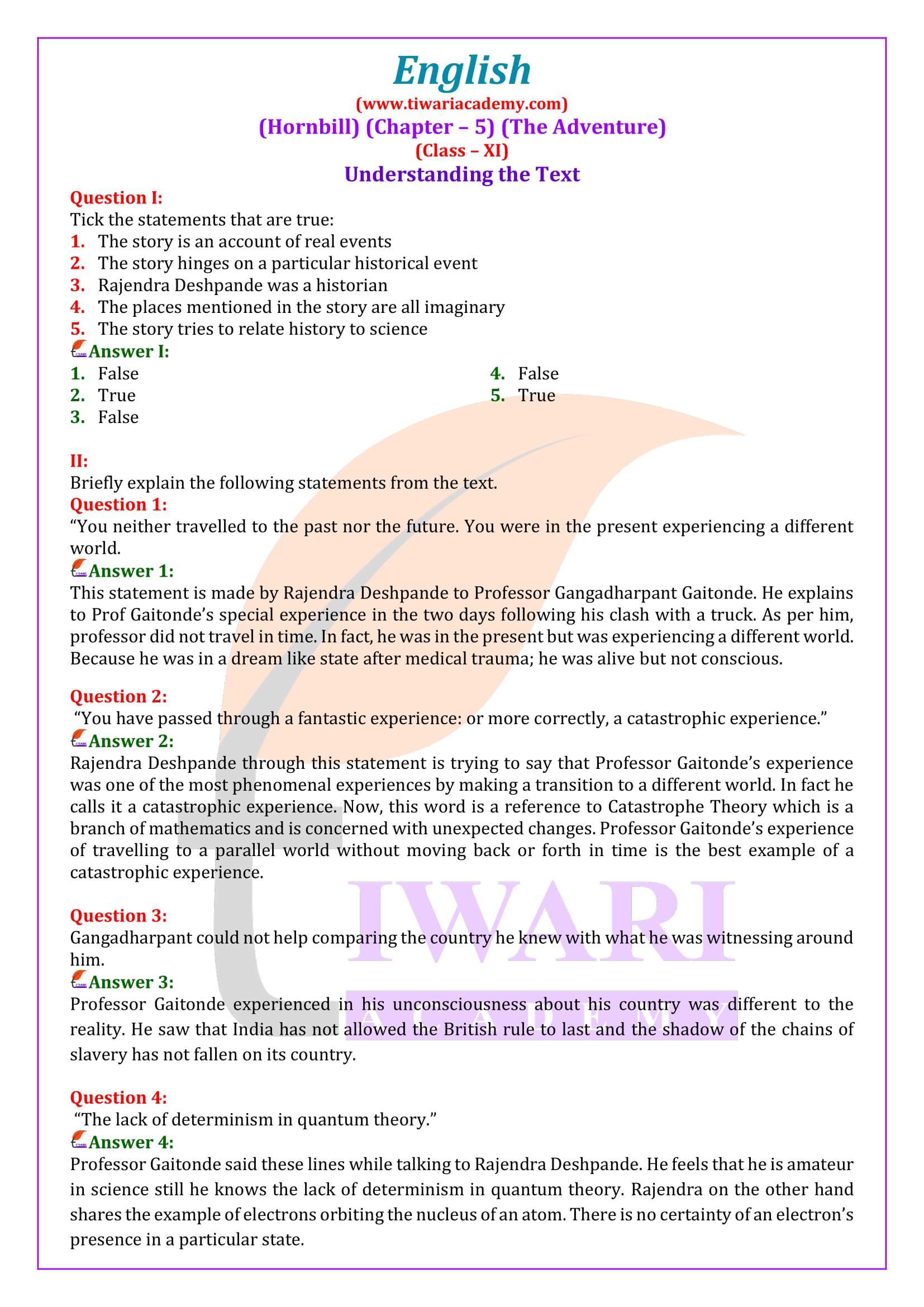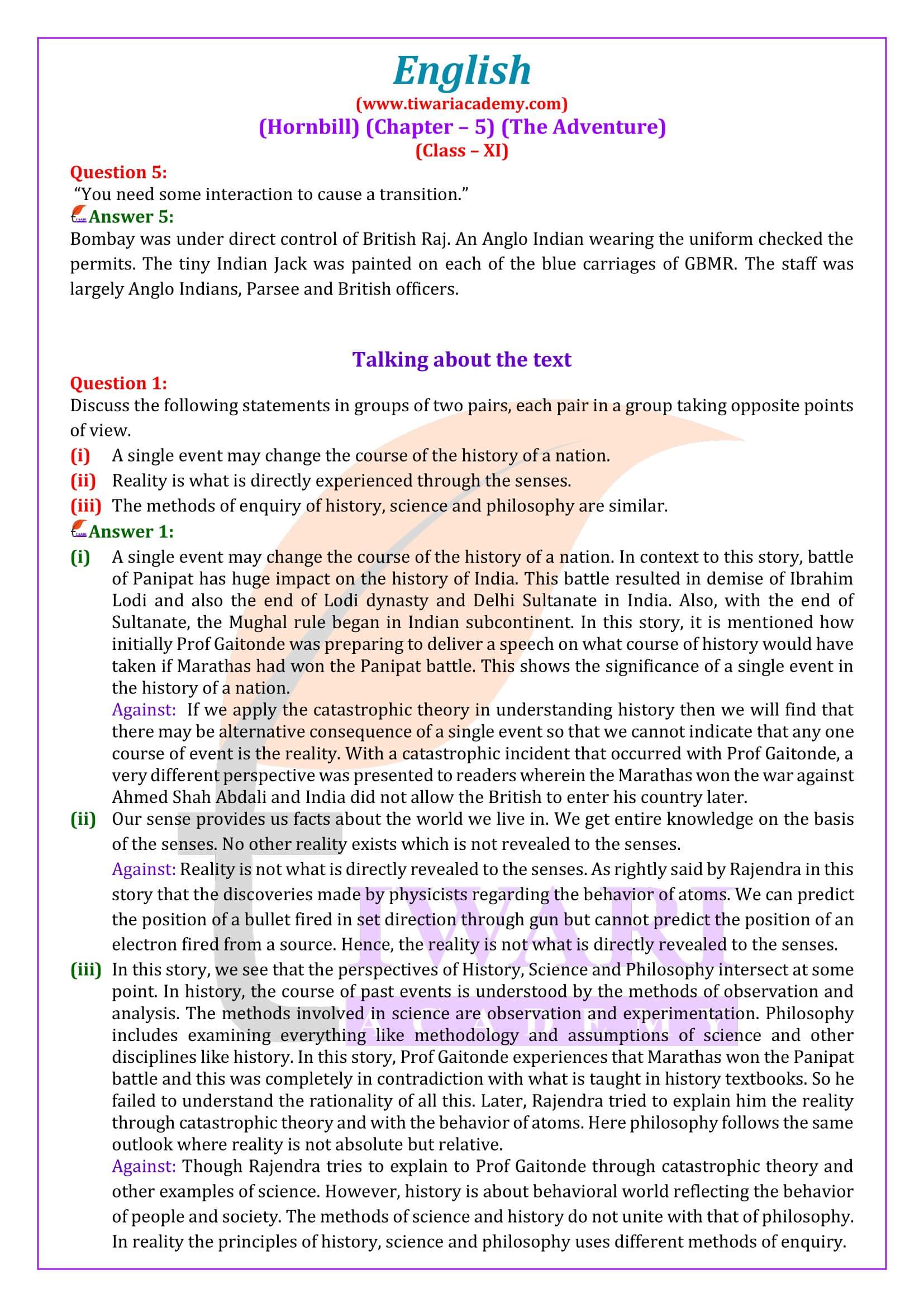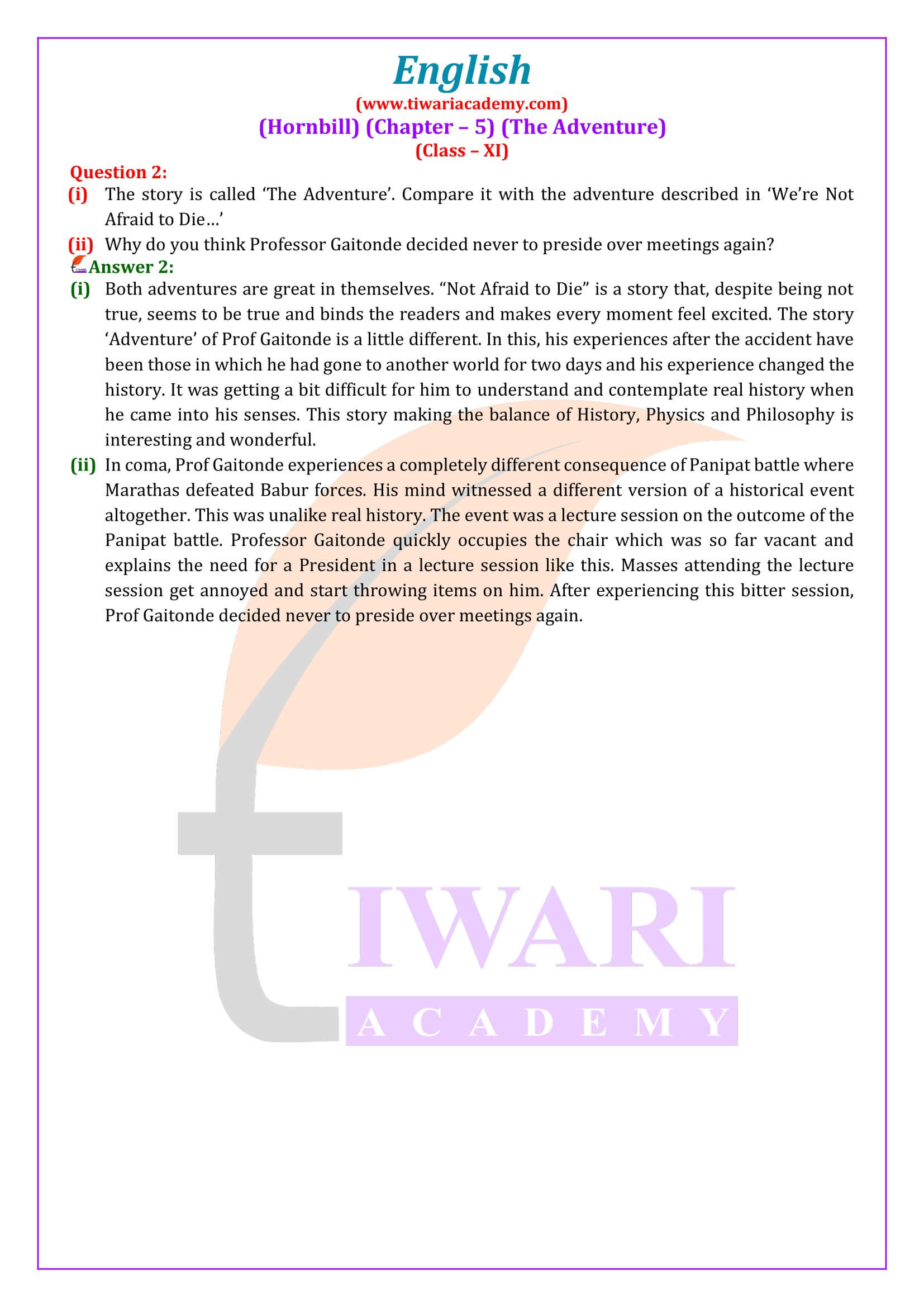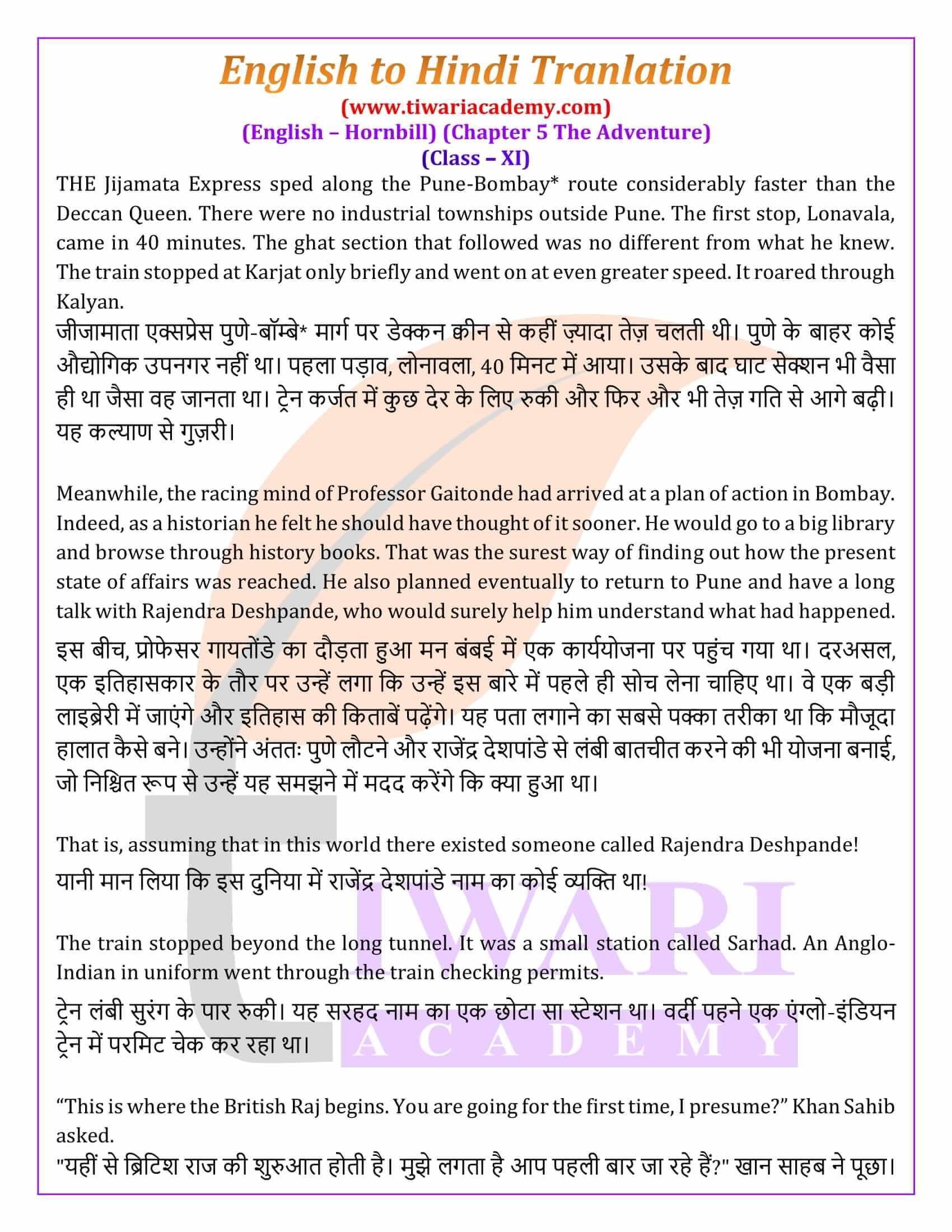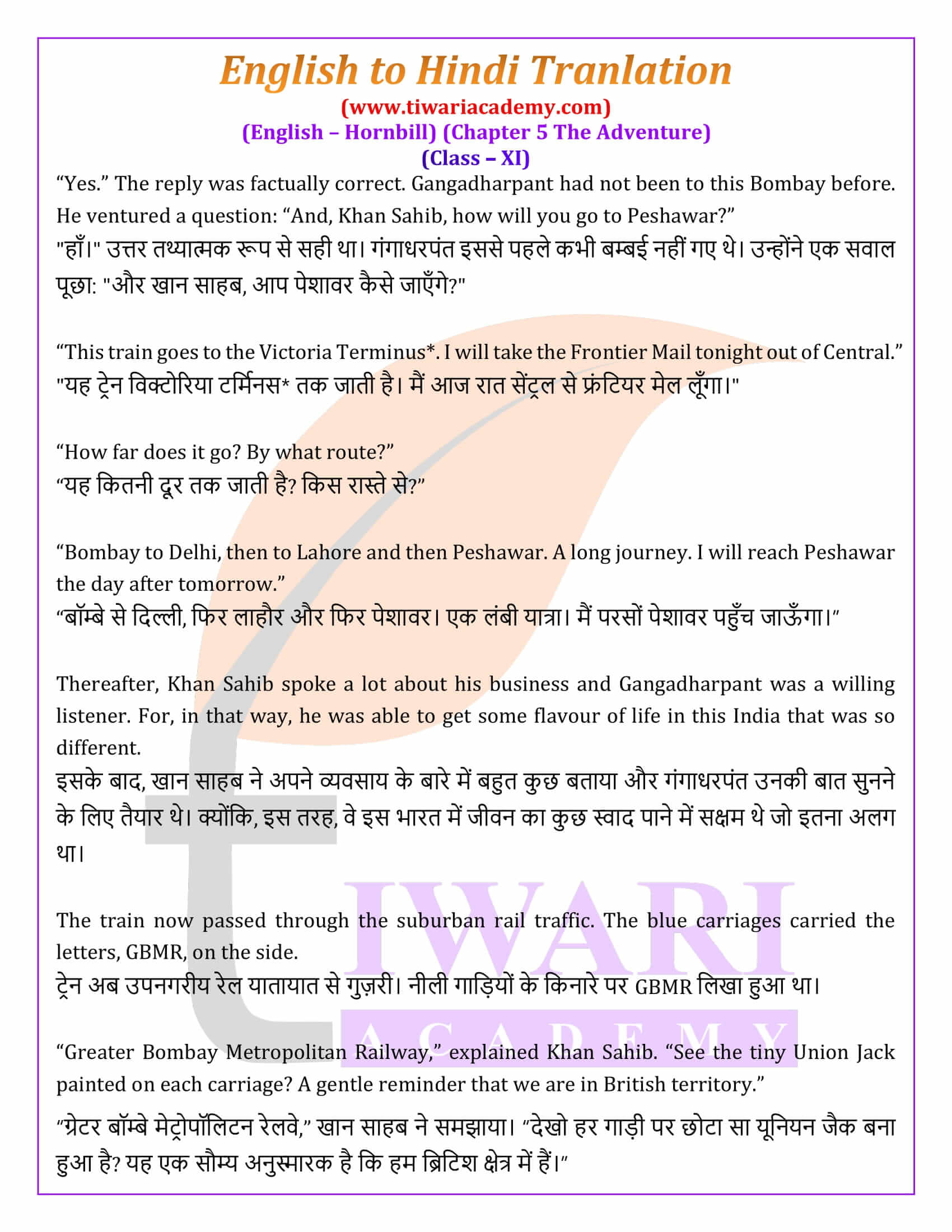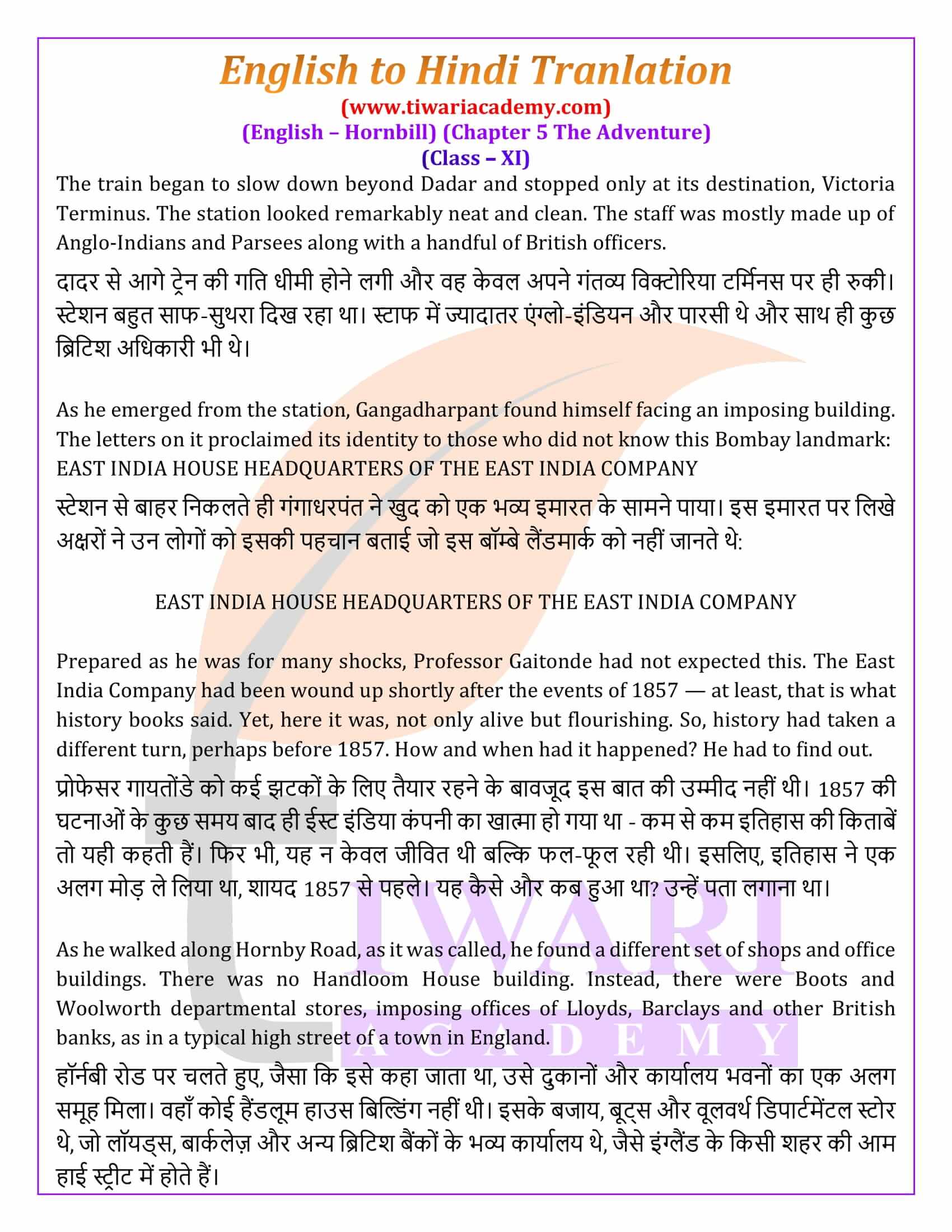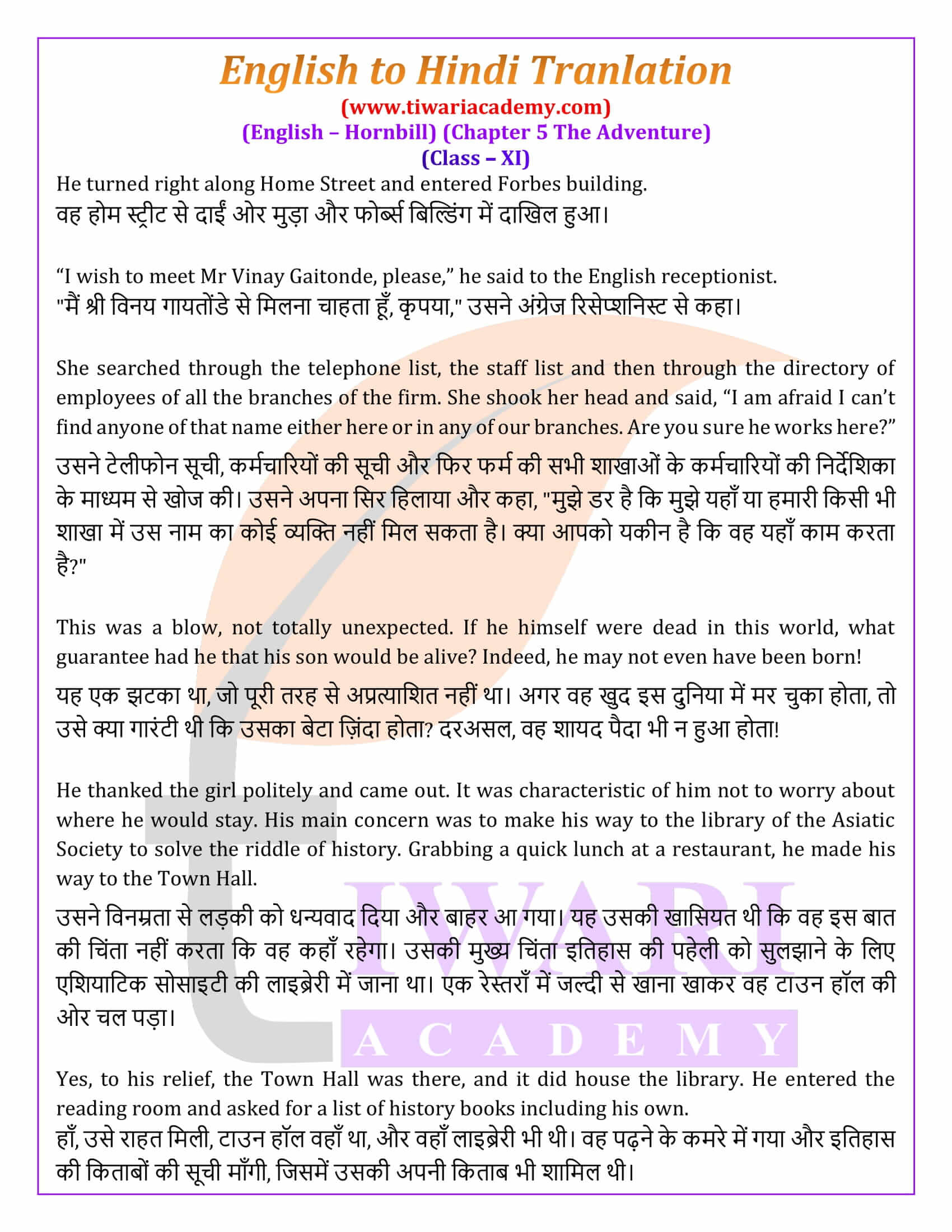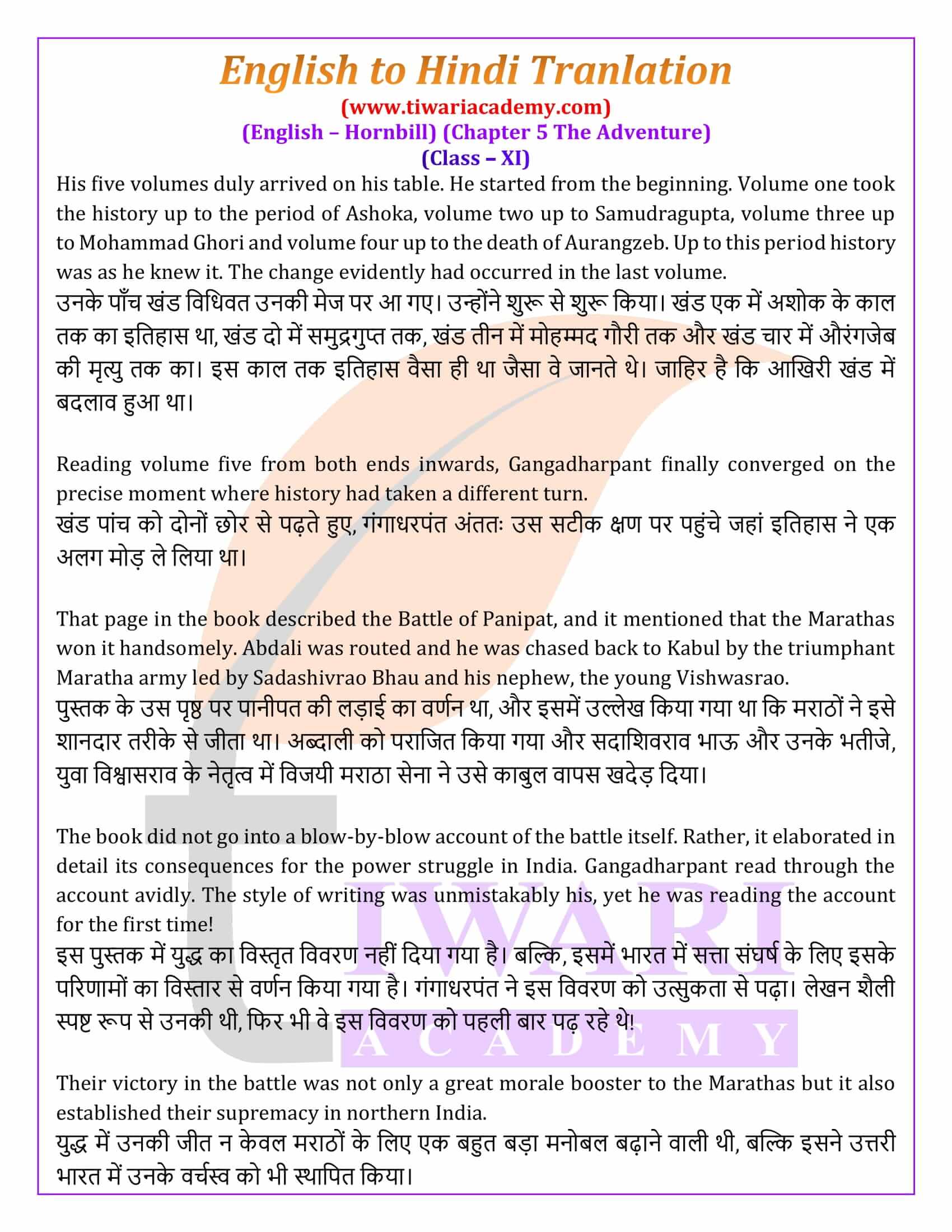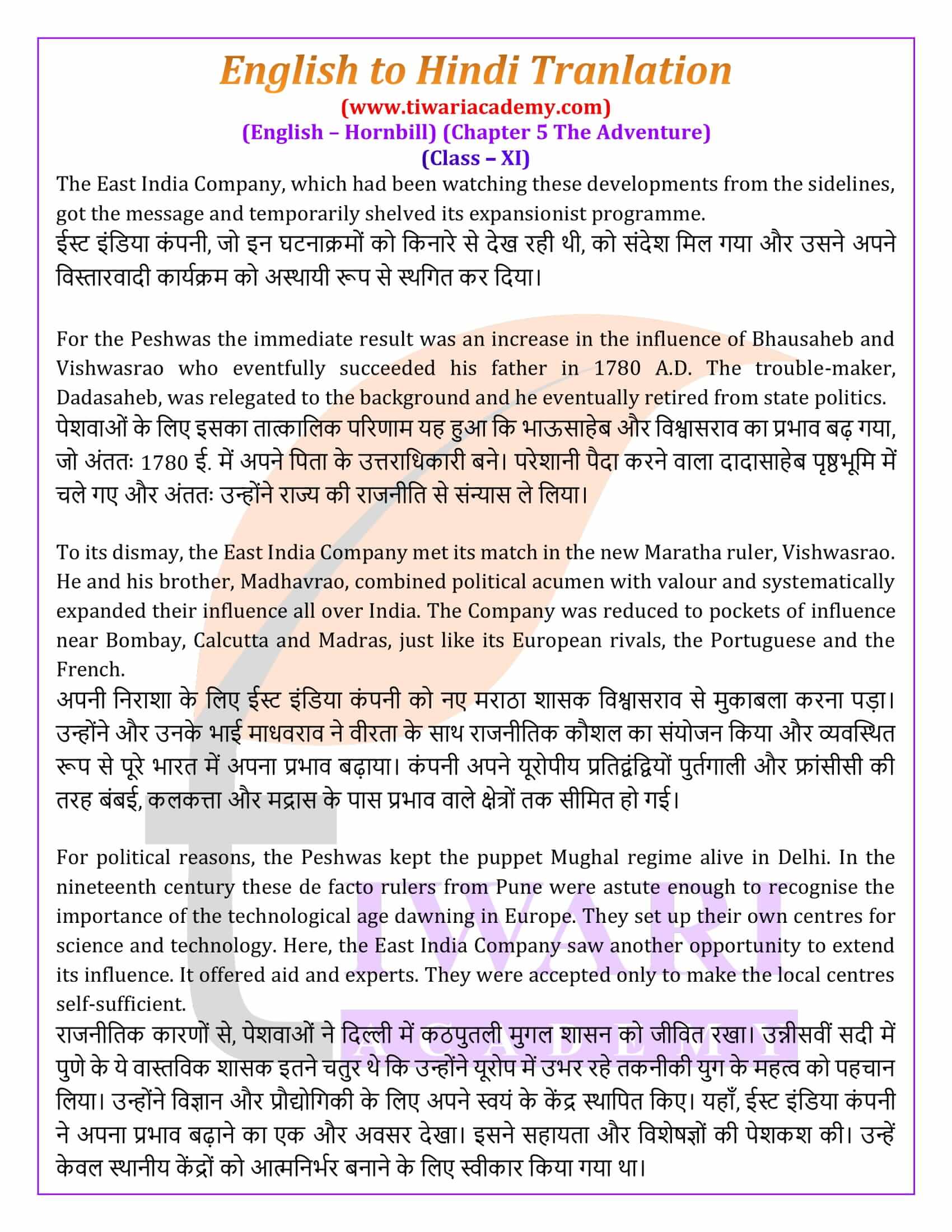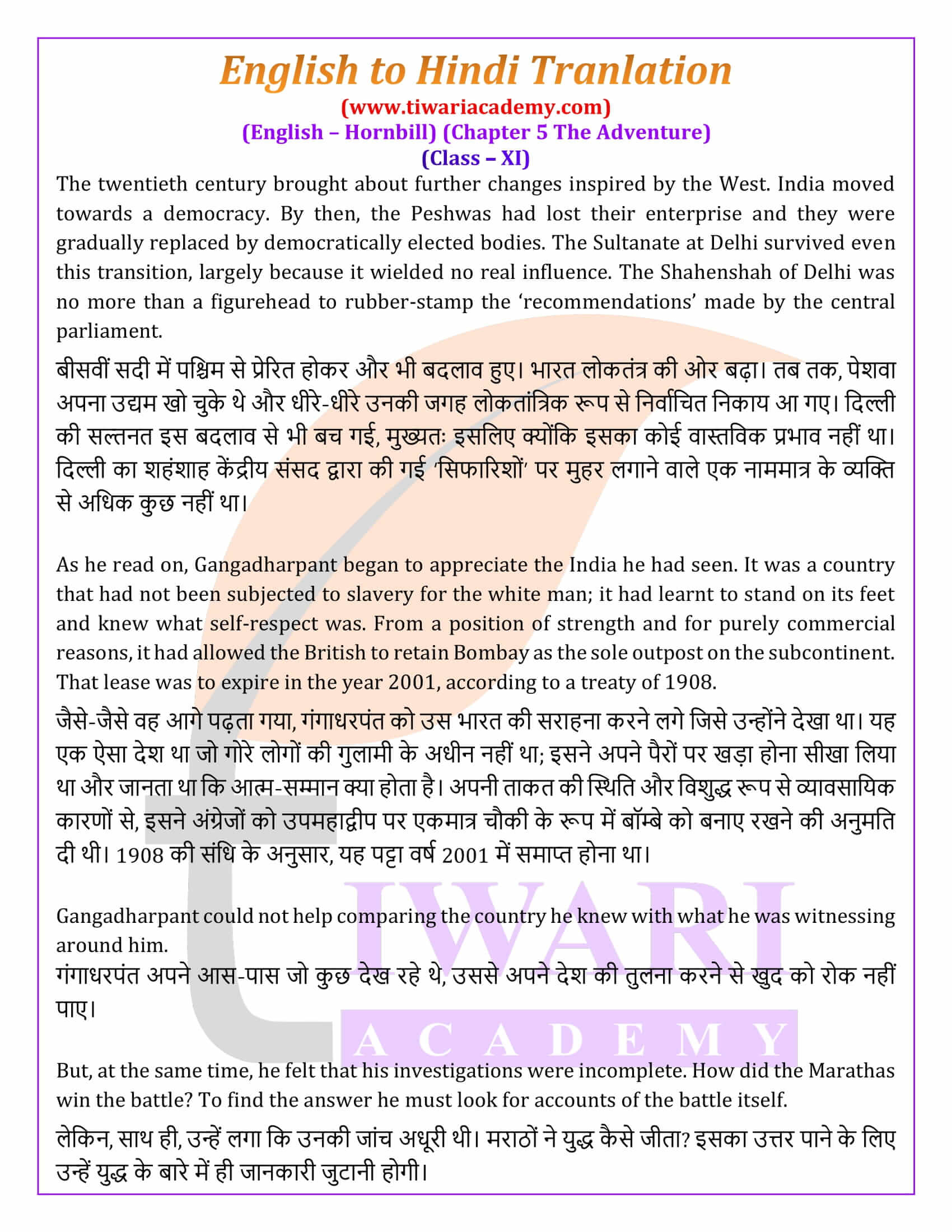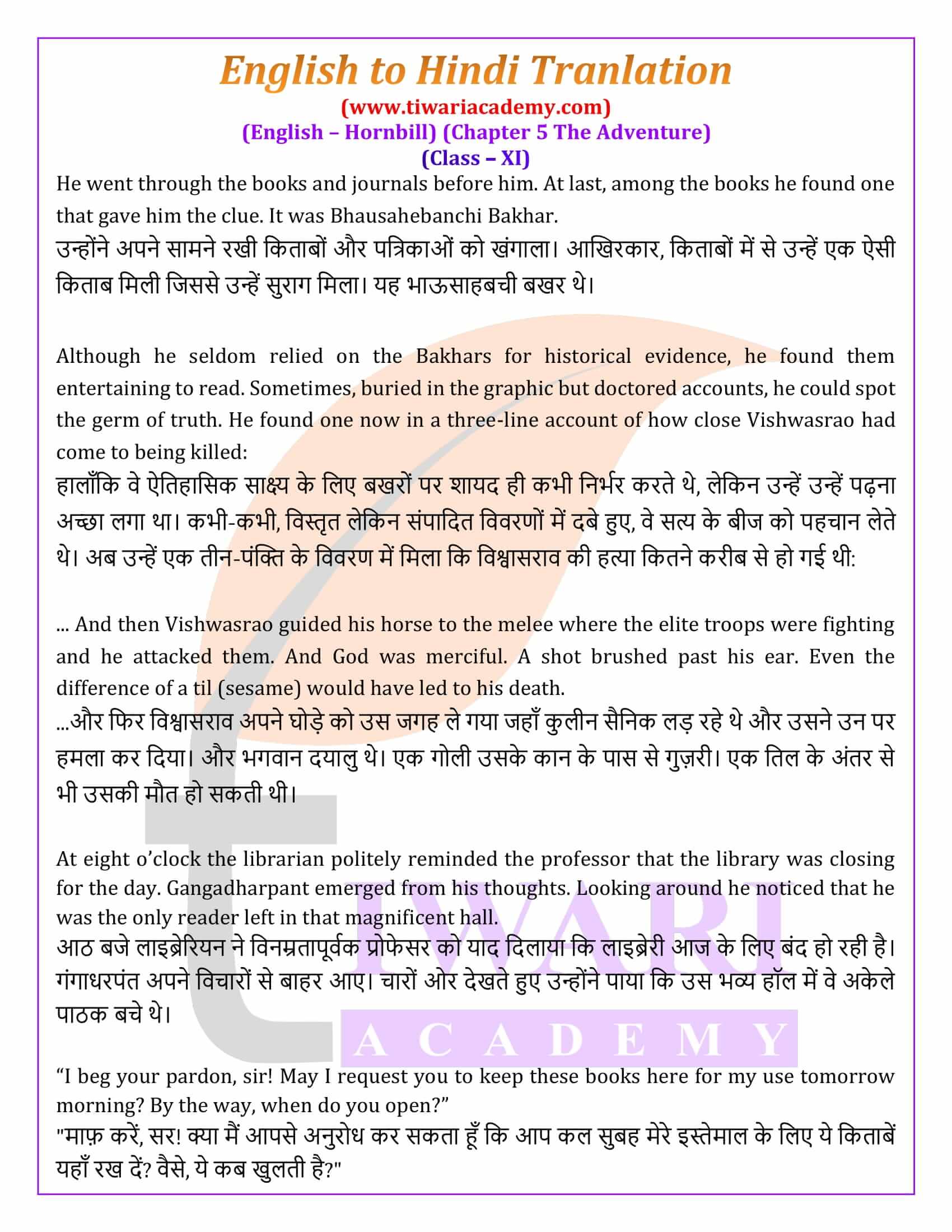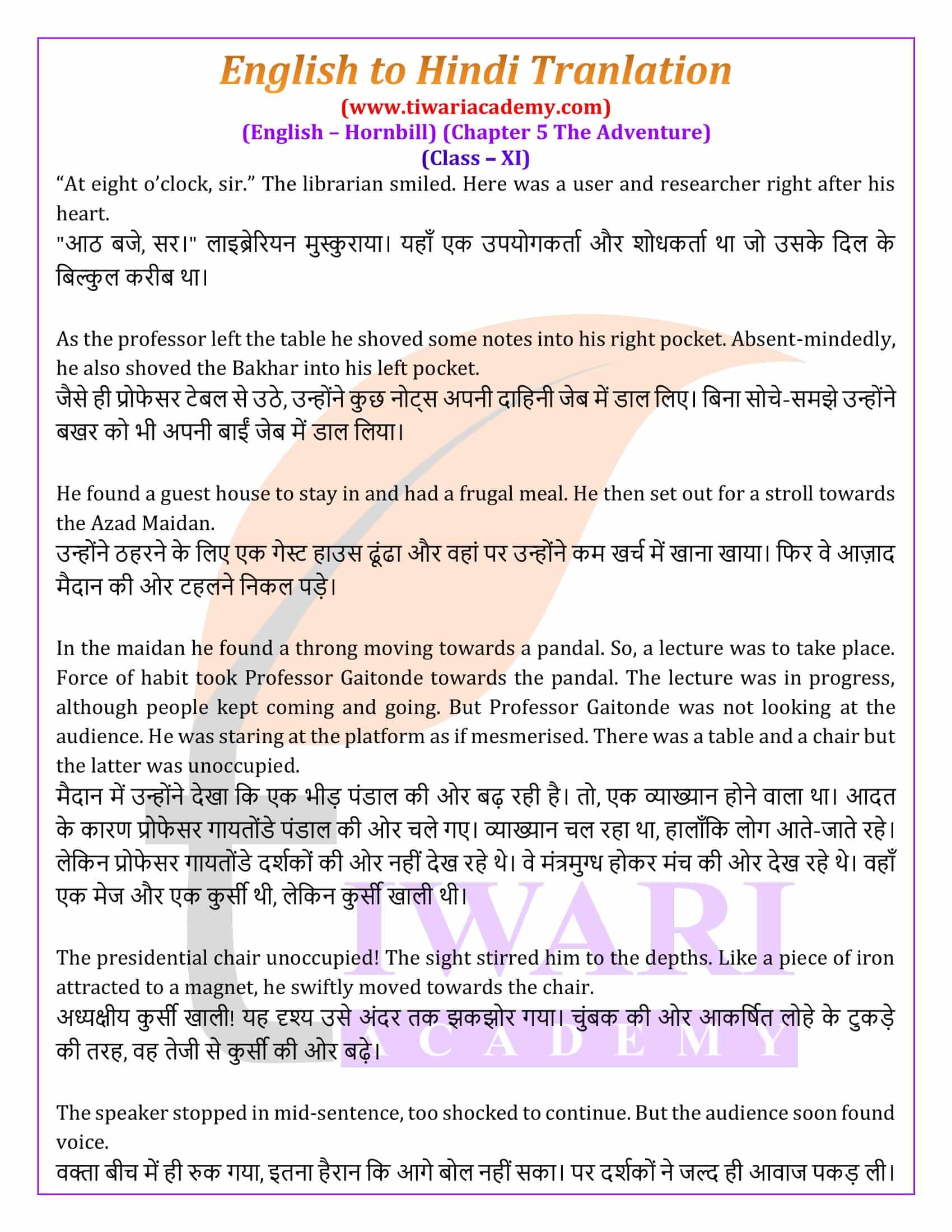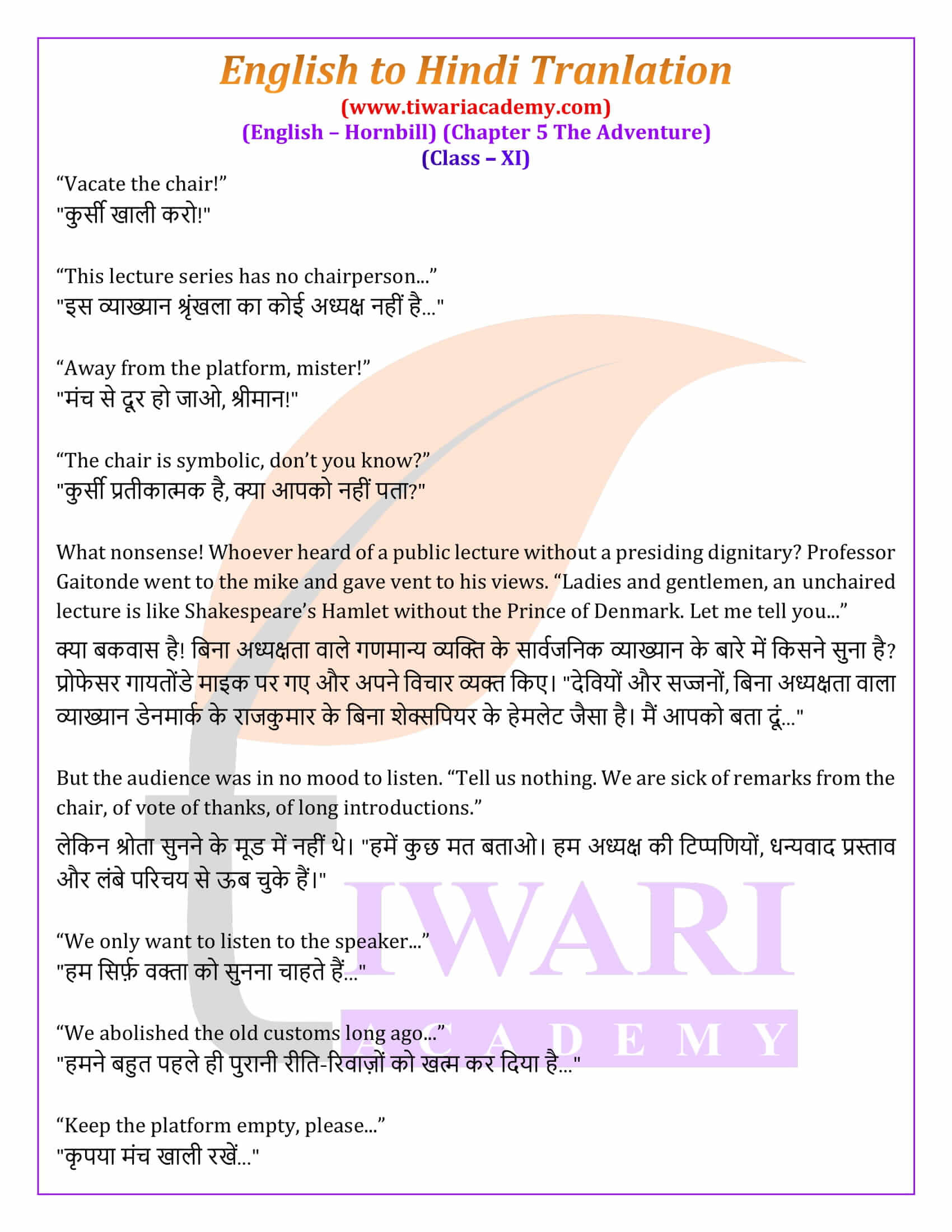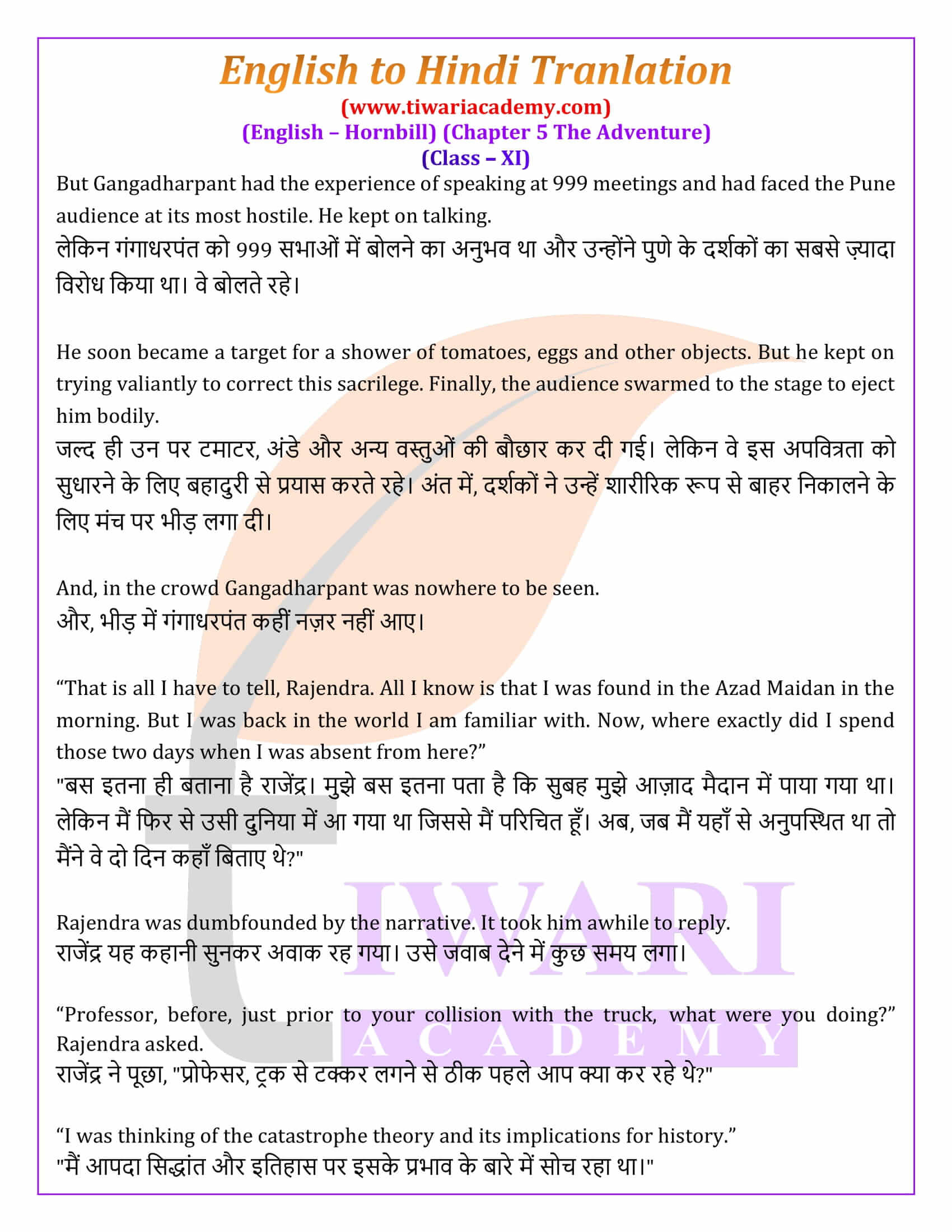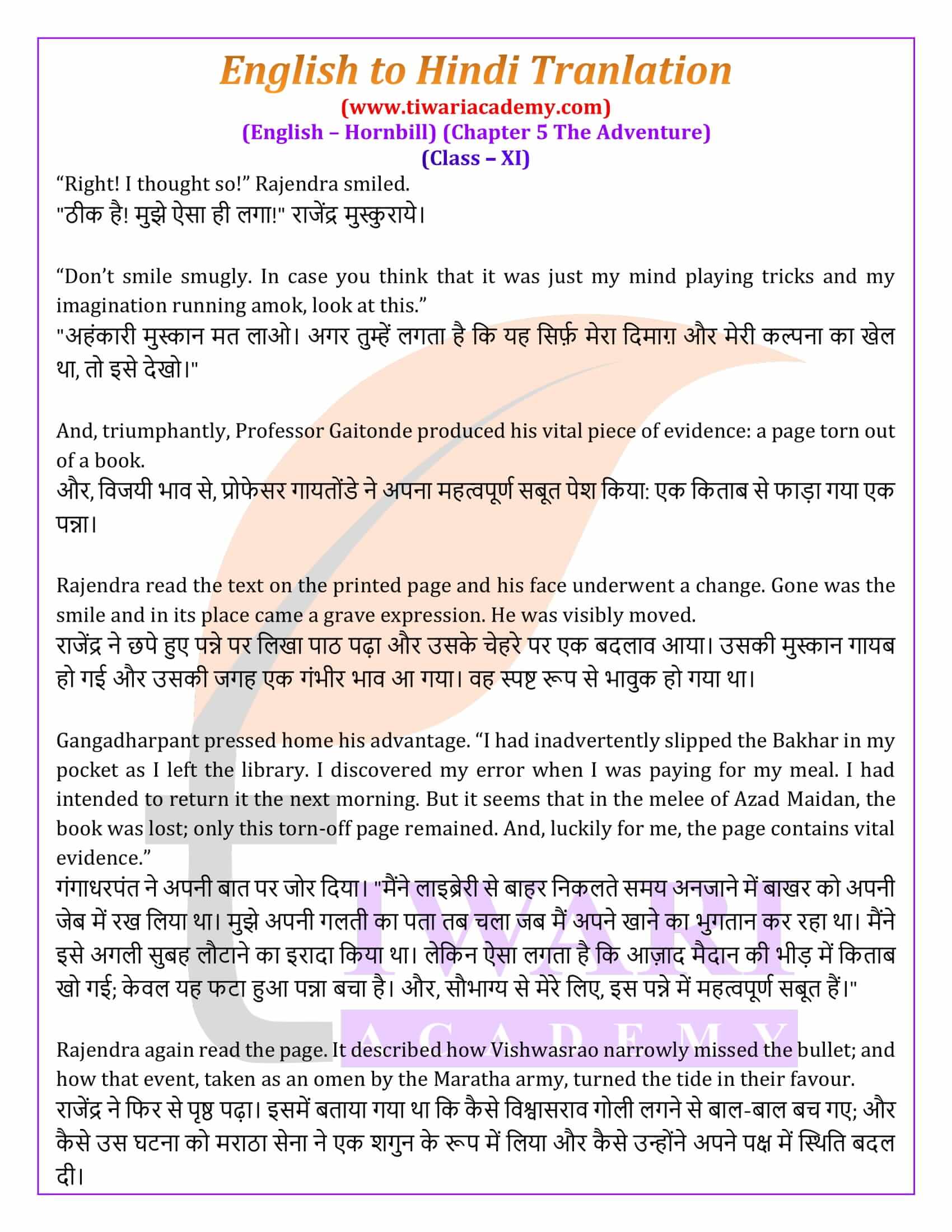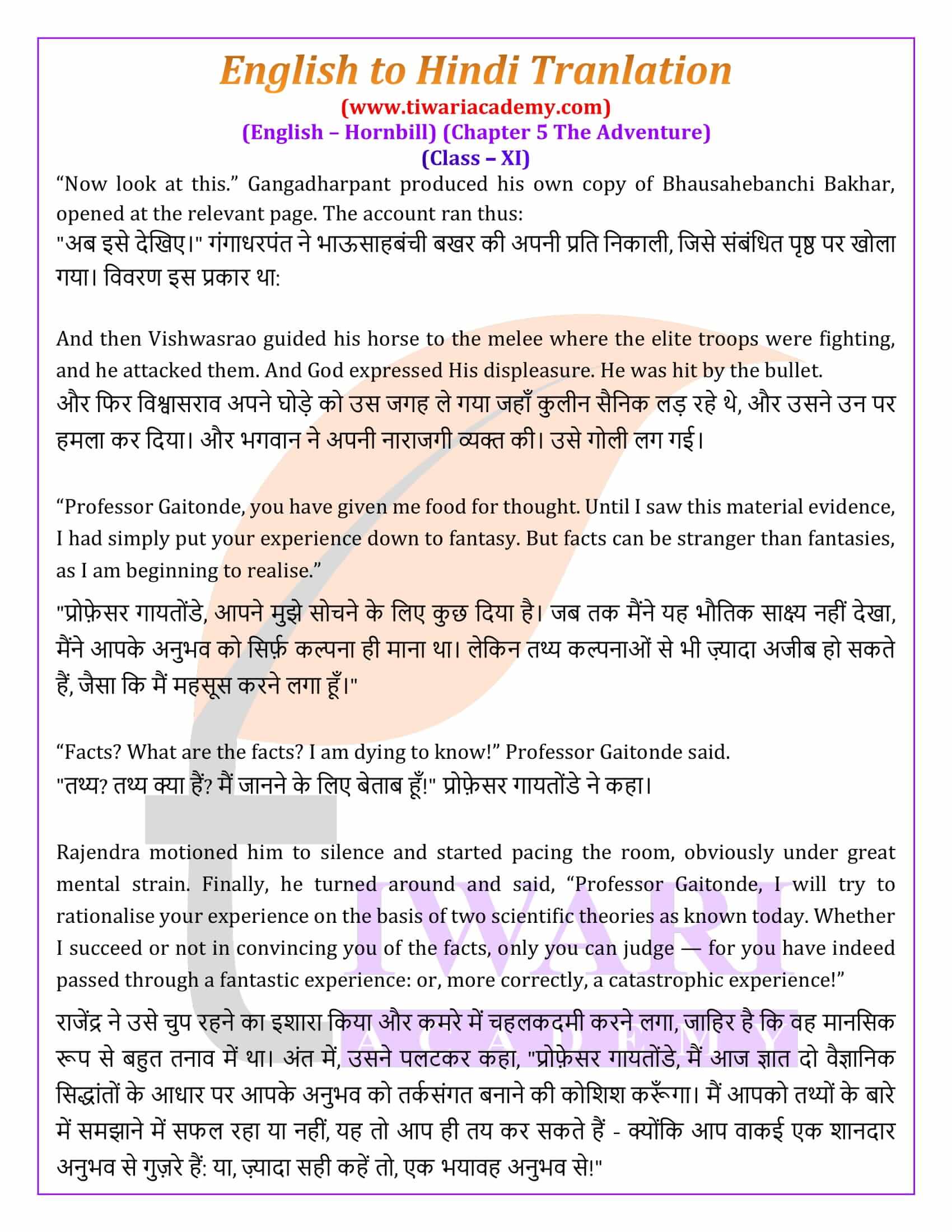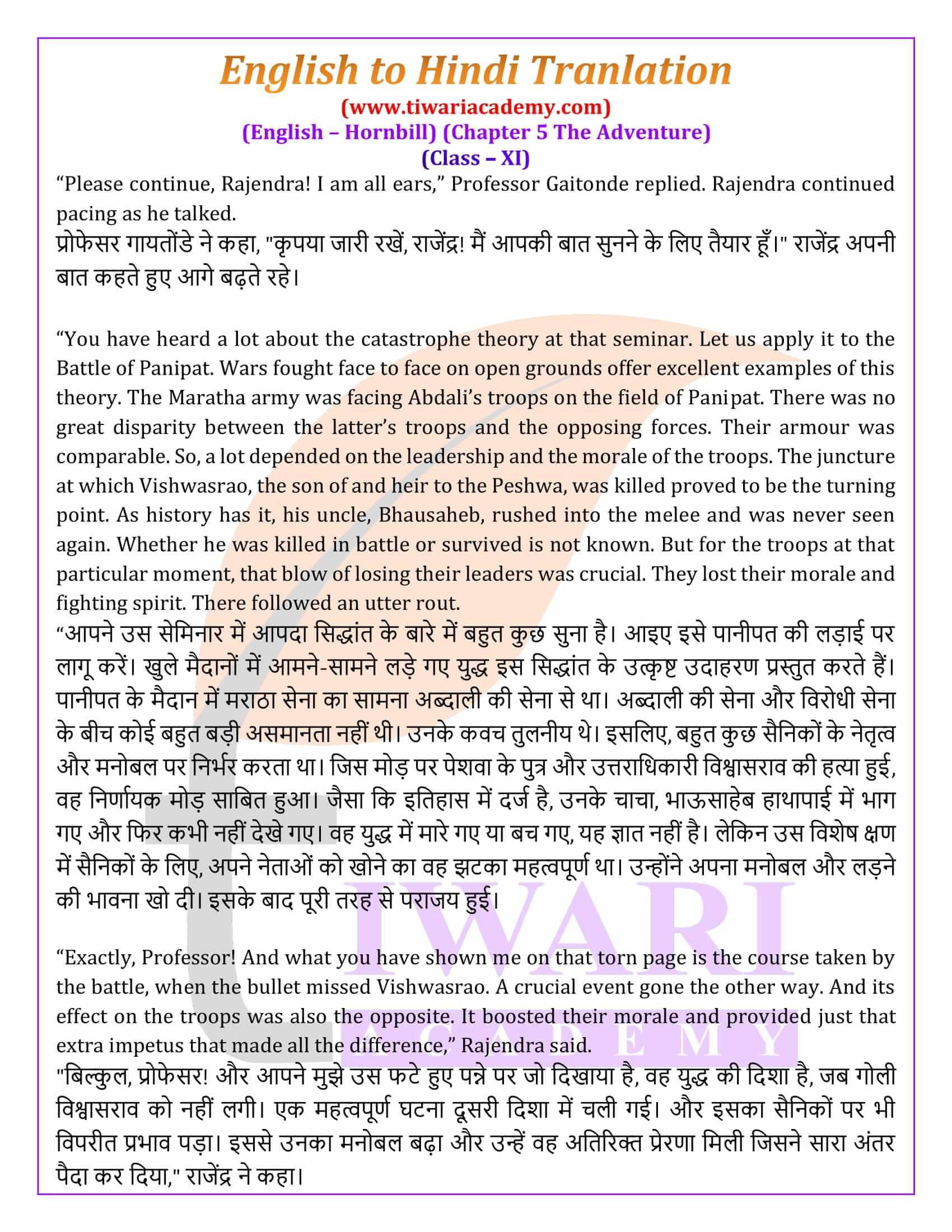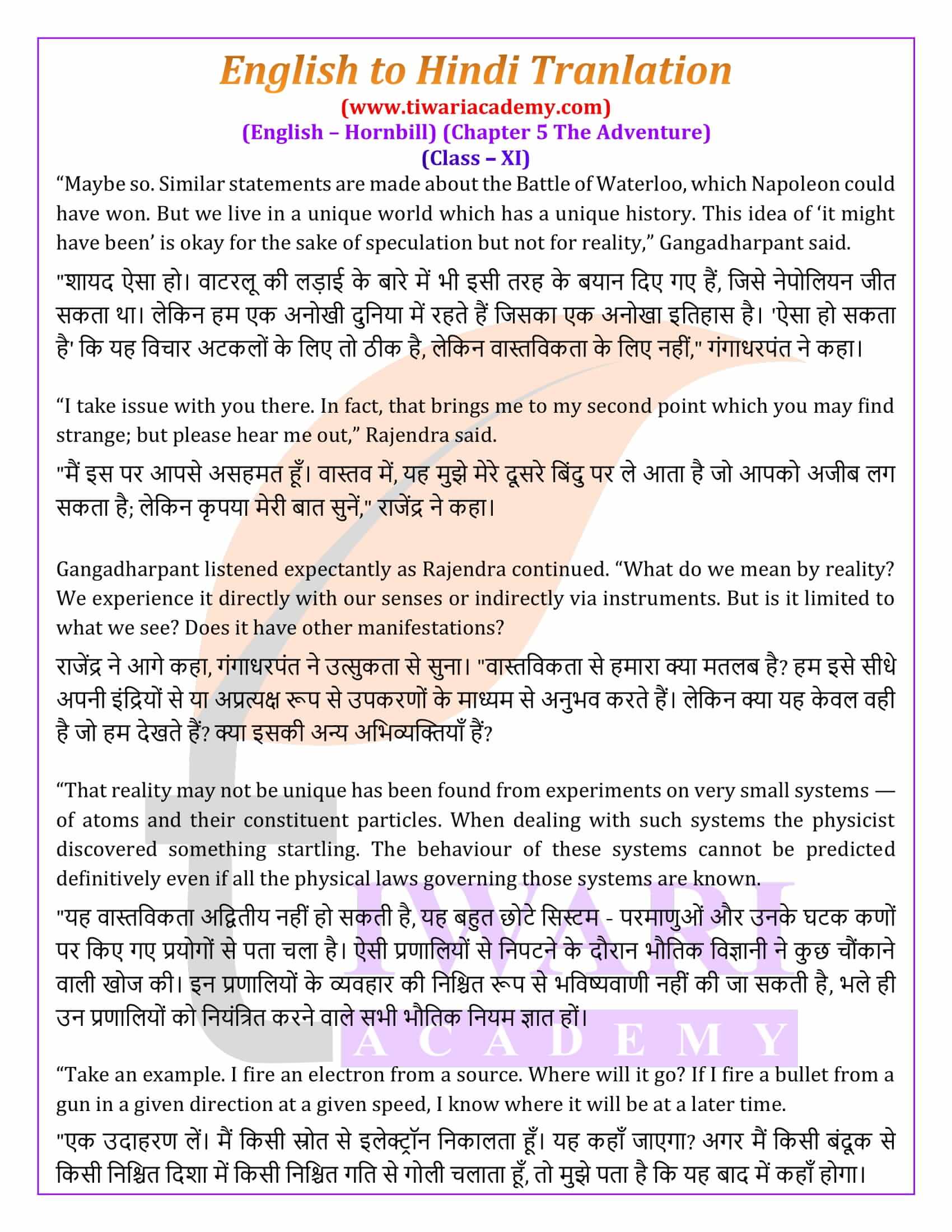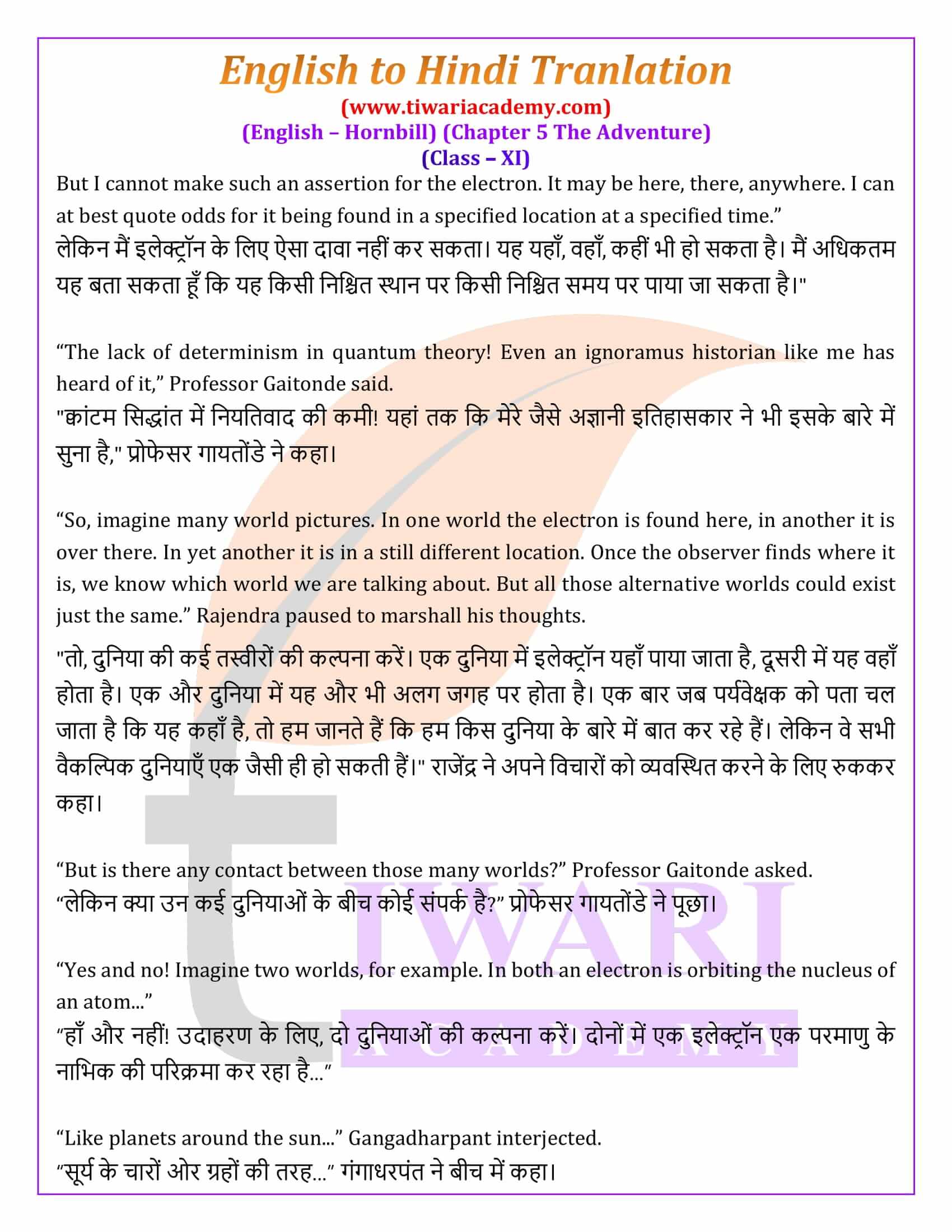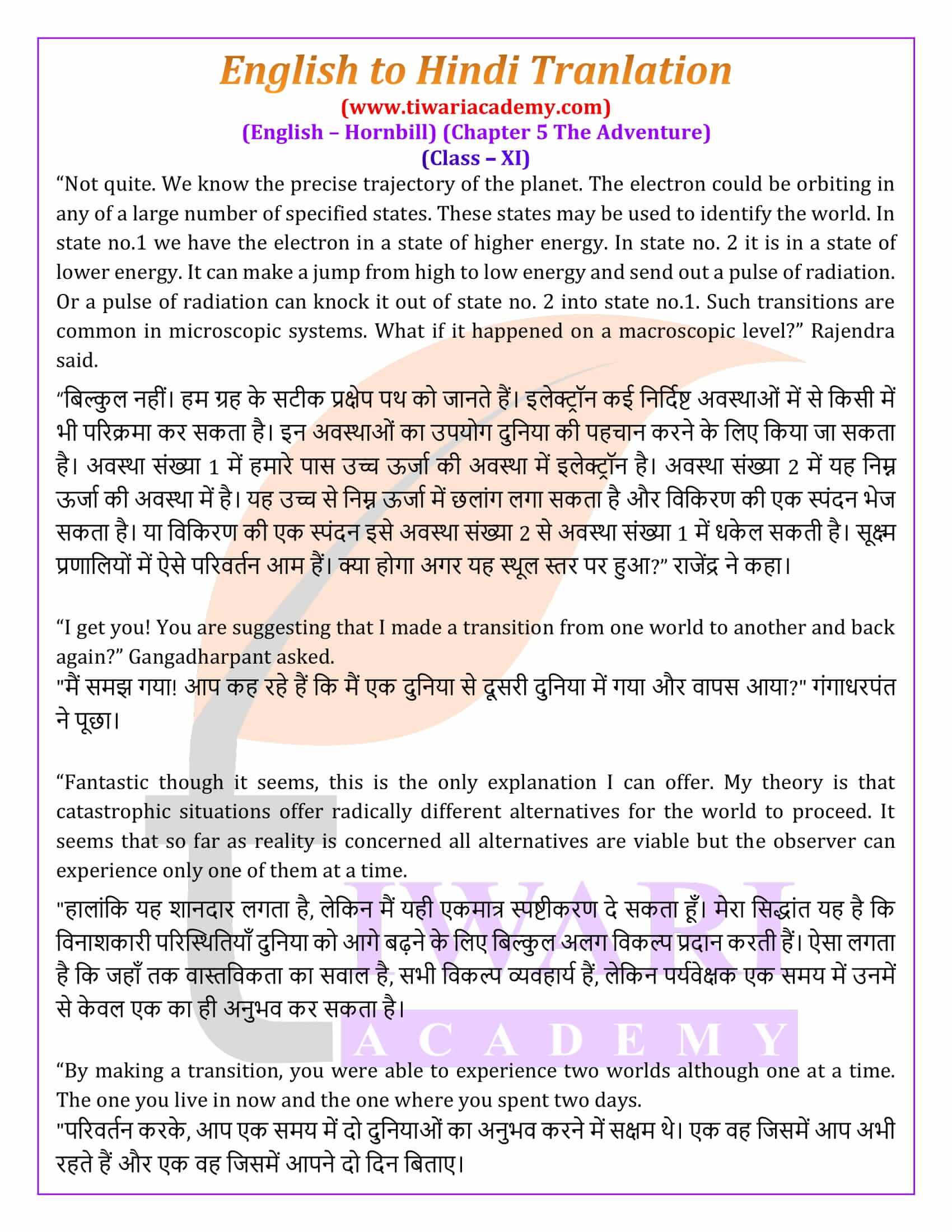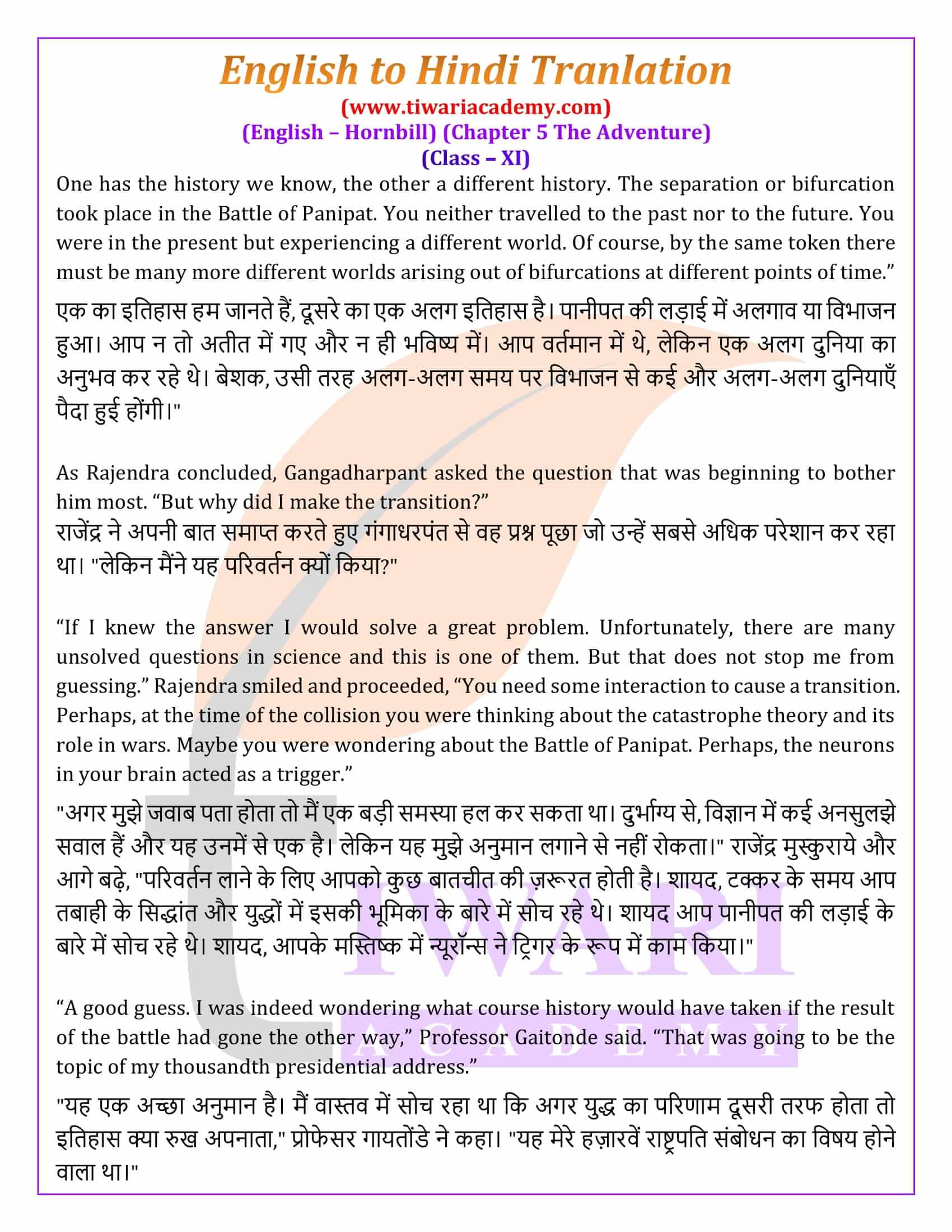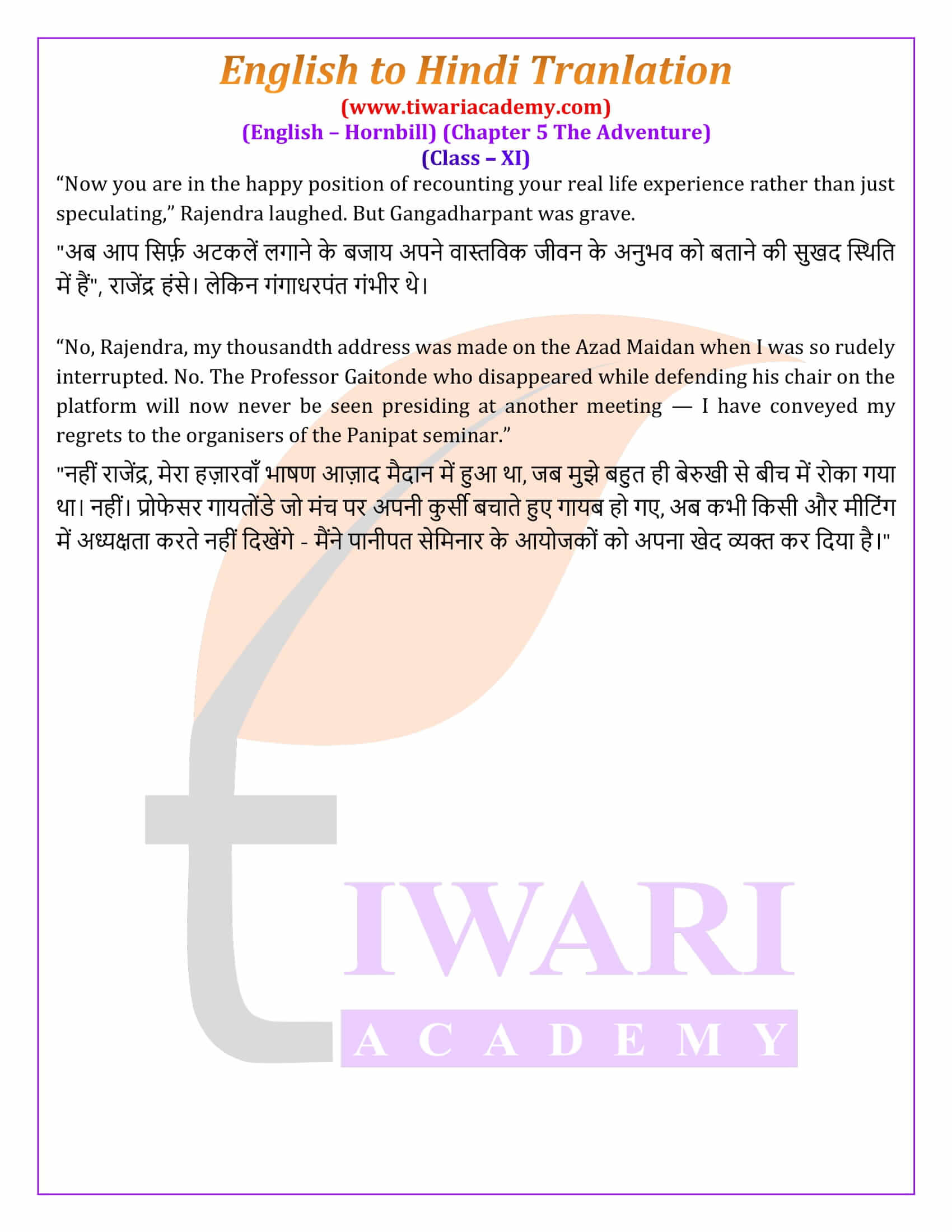NCERT Solutions for Class 11 English Hornbill Chapter 5 Hindi Translation the Adventure written by Jayant Narlikar updated for new academic session 2025-26. English to Hindi Translation and the study material for reading skills in English class 11 chapter 5 are given here with extra practice questions.
Class 11 English Hornbill Chapter 5 the Adventure Question Answers
- Class 11 English Hornbill Chapter 5 NCERT Solutions
- Class 11 English Hornbill Chapter 5 Hindi Translation
- Class 11 English Hornbill Chapter 5 MCQ with Answers
- Class 11 English Hornbill Chapter 5 Extra Questions
- Class 11 English Hornbill Chapter 5 NCERT Book
- Class 11 English Hornbill all Chapter’s Solutions
- Class 11 all Subject’s NCERT Solutions
Why do you think Professor Gaitonde decided never to preside over meetings again?
In coma, Prof Gaitonde experiences a completely different consequence of Panipat battle where Marathas defeated Babur forces. His mind witnessed a different version of a historical event altogether. This was unalike real history. The event was a lecture session on the outcome of the Panipat battle. Professor Gaitonde quickly occupies the chair which was so far vacant and explains the need for a President in a lecture session like this. Masses attending the lecture session get annoyed and start throwing items on him. After experiencing this bitter session, Prof Gaitonde decided never to preside over meetings again.
The story is called ‘The Adventure’. Compare it with the adventure described in ‘We’re Not Afraid to Die…’
Both adventures are great in themselves. “Not Afraid to Die” is a story that, despite being not true, seems to be true and binds the readers and makes every moment feel excited. The story ‘Adventure’ of Prof Gaitonde is a little different. In this, his experiences after the accident have been those in which he had gone to another world for two days and his experience changed the history. It was getting a bit difficult for him to understand and contemplate real history when he came into his senses. This story making the balance of History, Physics and Philosophy is interesting and wonderful.
Discuss the following statements in groups of two pairs, each pair in a group taking opposite points of view: A single event may change the course of the history of a nation.
A single event may change the course of the history of a nation. In context to this story, battle of Panipat has huge impact on the history of India. This battle resulted in demise of Ibrahim Lodi and also the end of Lodi dynasty and Delhi Sultanate in India. Also, with the end of Sultanate, the Mughal rule began in Indian subcontinent. In this story, it is mentioned how initially Prof Gaitonde was preparing to deliver a speech on what course of history would have taken if Marathas had won the Panipat battle. This shows the significance of a single event in the history of a nation.
Against:
If we apply the catastrophic theory in understanding history then we will find that there may be alternative consequence of a single event so that we cannot indicate that any one course of event is the reality. With a catastrophic incident that occurred with Prof Gaitonde, a very different perspective was presented to readers wherein the Marathas won the war against Ahmed Shah Abdali and India did not allow the British to enter his country later.
Reality is what is directly experienced through the senses. Discuss.
Our sense provides us facts about the world we live in. We get entire knowledge on the basis of the senses. No other reality exists which is not revealed to the senses.
Against: Reality is not what is directly revealed to the senses. As rightly said by Rajendra in this story that the discoveries made by physicists regarding the behavior of atoms. We can predict the position of a bullet fired in set direction through gun but cannot predict the position of an electron fired from a source. Hence, the reality is not what is directly revealed to the senses.
The methods of enquiry of history, science and philosophy are similar. Discuss.
In this story, we see that the perspectives of History, Science and Philosophy intersect at some point. In history, the course of past events is understood by the methods of observation and analysis. The methods involved in science are observation and experimentation. Philosophy includes examining everything like methodology and assumptions of science and other disciplines like history. In this story, Prof Gaitonde experiences that Marathas won the Panipat battle and this was completely in contradiction with what is taught in history textbooks. So he failed to understand the rationality of all this. Later, Rajendra tried to explain him the reality through catastrophic theory and with the behavior of atoms. Here philosophy follows the same outlook where reality is not absolute but relative.
Against
Though Rajendra tries to explain to Prof Gaitonde through catastrophic theory and other examples of science. However, history is about behavioral world reflecting the behavior of people and society. The methods of science and history do not unite with that of philosophy. In reality the principles of history, science and philosophy uses different methods of enquiry.
Briefly explain the following statements from the text.
You neither travelled to the past nor the future. You were in the present experiencing a different world.
This statement is made by Rajendra Deshpande to Professor Gangadharpant Gaitonde. He explains to Prof Gaitonde’s special experience in the two days following his clash with a truck. As per him, professor did not travel in time. In fact, he was in the present but was experiencing a different world. Because he was in a dream like state after medical trauma; he was alive but not conscious.
“You have passed through a fantastic experience: or more correctly, a catastrophic experience.”
Rajendra Deshpande through this statement is trying to say that Professor Gaitonde’s experience was one of the most phenomenal experiences by making a transition to a different world. In fact he calls it a catastrophic experience. Now, this word is a reference to Catastrophe Theory which is a branch of mathematics and is concerned with unexpected changes. Professor Gaitonde’s experience of travelling to a parallel world without moving back or forth in time is the best example of a catastrophic experience.
